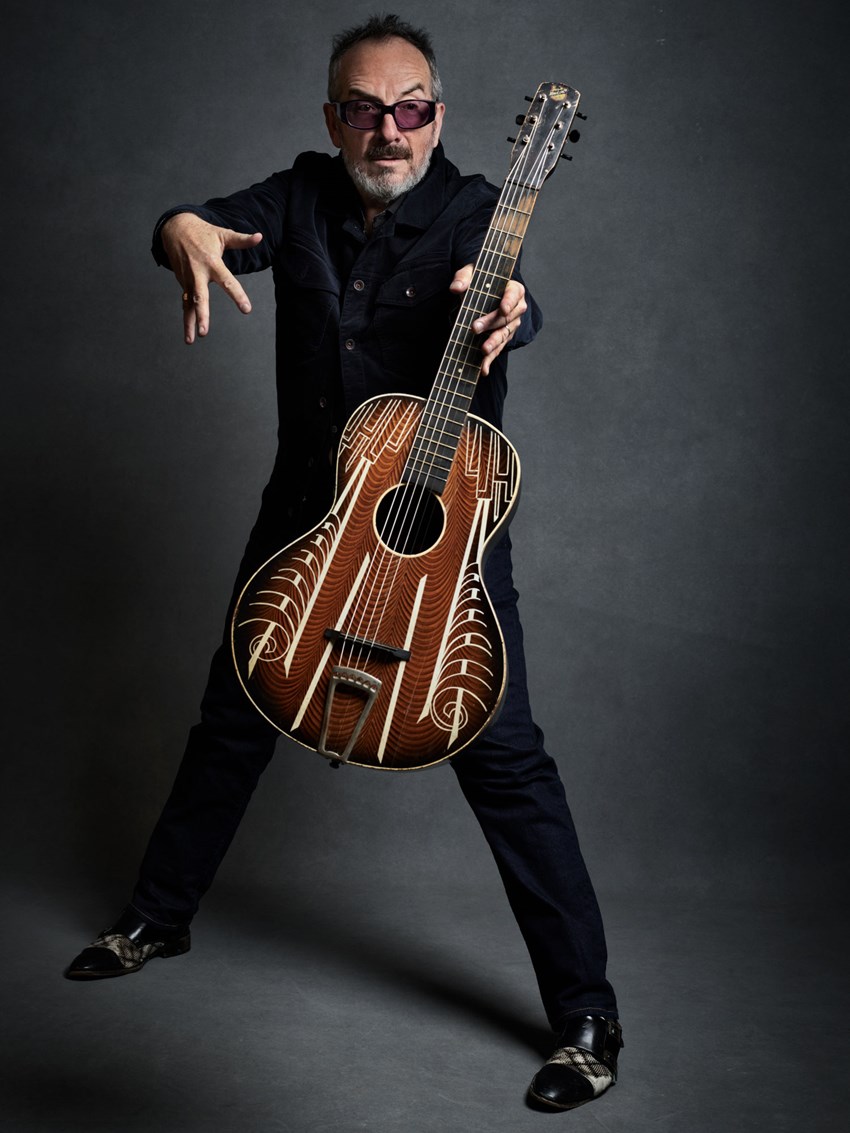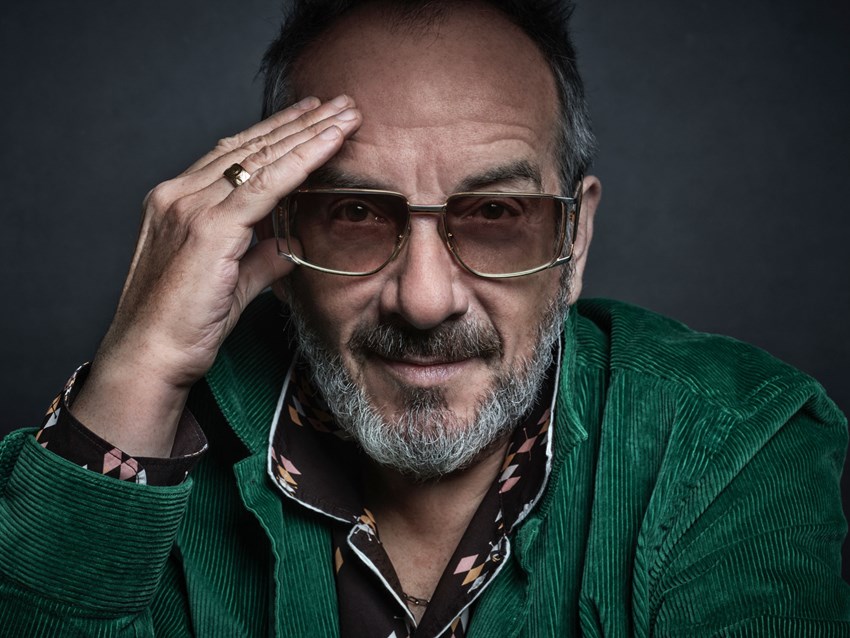Monday, March 14, 2022
Elvis Costello – My World: “We need to get free of being so impressed with our own continuity and music”
The British singer-songwriter tells Russ Slater all about his disparate musical tastes, from country to Ethiopian music and almost everything in between. Photography by Mark Seliger

“I just think we need to get free from self. We need to get free of being so impressed with our own continuity and music,” says Elvis Costello heatedly. With Costello, this was a necessary evolution after being marked as part of a nascent UK punk scene following his debut album in 1977. “I was actually touring England in 1977 and people couldn’t give a fuck about punk music in most places. That was just something made up by journalists in London. I’ve got pictures of the audience in 1977 in the smaller towns in England and it looks like an audience of Status Quo fans.” Costello quickly shook the punk tag, and the New Wave tag that followed it, his curiosity and need to wrangle free from his own continuity, ensuring that it has been nigh on impossible to pigeonhole him ever since. There have been operas, ballet scores, jazz instrumentals, a surprise hit single with Charles Aznavour’s ‘She’, high-profile collaborations with Paul McCartney, Burt Bacharach and Allen Toussaint, and so much more.
Yet, despite looking disparate on the face of it, I find that so many of Costello’s projects have their roots in his earliest musical discoveries, when he would find “little hints of other worlds of music filtering through the very small amount of radio, or the record shop where they said ‘you need that record’.” Country music had a pull, discovering the likes of Johnny Cash (“he stood out because of the way he sang”), Hank Williams, George Jones and Gram Parsons, and paying tribute with an album of country covers in 1981. He would also duet with Jones and Cash, and regularly return to Nashville, with a story about working with bluegrass musicians beginning, in typically Costello fashion, somewhere completely different. In this case, it was a chamber opera he wrote in Denmark about Hans Christian Andersen’s unrequited love for opera singer Jenny Lind and the latter’s PT Barnum-promoted tour of the US.

“When I say it now, it sounds completely nuts”, he remembers, “but it gave me an opportunity to talk about unrequited love, and the debate about abolition [because] Barnum and eventually Andersen were drawn into it.” Songs from the opera would later show up, albeit in a very different style, on 2009’s Secret, Profane & Sugarcane. “I took those songs written for the opera house, and I put them in Jack Clement’s studio in Nashville and we recorded a couple of songs I’d written for Johnny Cash, a song for an adaptation of All the King’s Men, about Huey Long. They were rooted in American stories, so, to me, it didn’t seem contradictory to be using American musicians, people that have grown out of the American folk tradition,” alluding to the fact that he worked with a number of bluegrass musicians. “Well, people say bluegrass because you’ve got a dobro and a mandolin,” he replies, “but they’ve all played hundreds of other things as well. Jerry Douglas is a master musician.”
“‘The Miranda Syndrome’ is about the way dominant cultures regard others with a sense of novelty”
Along with radio and record shops, the young Costello got his early music fix from his father Ross MacManus, a singer and trumpeter of Irish descent. It was while looking through his dad’s collection that he found the records by Louis Armstrong and Fats Waller that informed a love for jazz and New Orleans music, as well as one by The Chieftains, who he would record with in 1991 and again in 1998 when he sang the theme to Long Journey Home, a TV series about the Irish American experience. “I love that song”, he tells me. “I got to sing that with them one St Patrick’s night. Paddy [Moloney] didn’t ever dream little, so he told me, ‘let’s go to Carnegie Hall with the Notre Dame [Folk Choir], and let’s do it like it’s the national anthem’… That was the conceit of that song, it was supposed to be the national anthem of the Irish in America.”
It’s through his father that we can also chart a path into Latin music: “As a child, I went to the dancehall with my father. We went to the Hammersmith Palais and there was the Joe Loss Orchestra [who his father sang with], who were a 16-piece radio dance band playing Latin, they would do tango or a paso doble.”

Costello contributed two songs to Rubén Blades’ first English language album, Nothing but the Truth (1988), one of which was ‘The Miranda Syndrome’, “a satirical song about the way in which all dominant cultures regard others with a sense of novelty. I was referring to Carmen Miranda. If she’d stood still and just sung without a bunch of fruit on her head, would people have made her a movie presence?” Later, he sang with Bajofondo Tango Club, La Santa Cecilia, Fito Páez and worked with La Marisoul on ‘Cinco Minutos Con Vos’, from a 2013 album with The Roots, Wise Up Ghost. Which leads us to last year’s Spanish Model, an album on which Costello and his producer Sebastian Krys gave the master tapes for his 1978 album, This Year’s Model, to some of Latin music’s biggest stars, who then recorded new Spanish-language cover versions. It briefly saw Costello become an unlikely TikTok phenomenon: “I don’t even understand how that works or what it’s supposed to mean, but the record company has pointed out that there are young women, influencers, dancing around to [Sebastian] Yatra’s version of ‘Big Tears’.” Search for the song on TikTok and you will find countless videos of young Latinas choosing their day’s outfit to the track.
Our conversation digresses into Ethiopian music (“I happened to be in an Ethiopian restaurant and they were playing this incredible music. It was Ketema Makonnen… I went looking for his records and eventually found them in Axum”) and The Paths of Pain, a new compilation of 60s Ecuadorian music (“I thought it was so beautiful and honestly, I think it’s a wonderful thing when somebody puts the time in to collect things together like that… otherwise, it’s a story we might not know”), before returning to the recently-passed Paddy Moloney: “One of the beautiful things about Paddy was the way in which he could go to countries anywhere in the world and he’d find a musical connection to [the local] music and would do the scholarship on it. [The Chieftains] created all these bridges between different… well, in the end, it’s shared subject matter, or a shared spirit of music that really unites us across a barrier of language, or some political boundary.” These are words that could just as easily be applied to Costello himself.
Hear ‘Long Journey Home (Anthem)’ by The Chieftains with Elvis Costello on the free CD included with the April 2022 issue of Songlines magazine.

